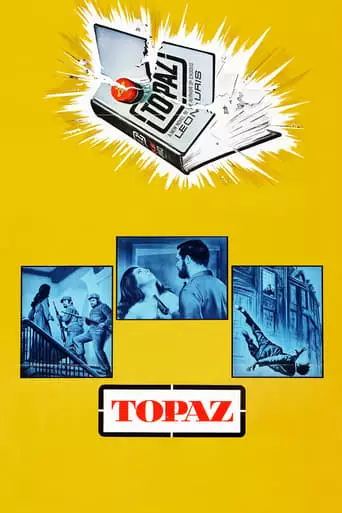Copenhagen, Denmark, 1962. When a high-ranking Soviet official decides to change sides, a French intelligence agent is caught up in a cold, silent and bloody spy war in which his own family will play a decisive role.
Topaz (1969), directed by Alfred Hitchcock, is a Cold War espionage thriller that delves into the intricate world of international intelligence during the Cuban Missile Crisis. The narrative unfolds in 1962, beginning with the defection of high-ranking Soviet intelligence officer Boris Kusenov (John Vernon) to the West. During his debriefing, CIA agent Mike Nordstrom (John Forsythe) learns of Soviet plans to deploy nuclear missiles in Cuba. To obtain concrete evidence, Nordstrom enlists French intelligence agent André Devereaux (Frederick Stafford) to infiltrate the Cuban delegation at the United Nations. Devereaux’s mission leads him to New York City, where he attempts to photograph confidential documents from Cuban official Luis Uribe (Raul Davila). The operation escalates, involving Devereaux’s family and colleagues, as they uncover a Soviet spy ring, Topaz, embedded within the French intelligence service. The film intricately weaves personal relationships with espionage, highlighting the moral complexities and personal costs of intelligence work.
Main Themes
- Espionage and Betrayal
Topaz explores the clandestine world of espionage, focusing on the moral ambiguities and personal sacrifices inherent in intelligence work. The narrative delves into themes of loyalty and betrayal, as characters navigate a web of deception and covert operations.
- Political Intrigue and International Relations
The film examines the delicate balance of international relations during the Cold War, highlighting the tensions between the United States, the Soviet Union, and Cuba. It portrays the high-stakes nature of political maneuvering and the far-reaching consequences of covert actions.
- Personal Sacrifice and Moral Dilemmas
Central to the story is the personal cost of espionage. Characters grapple with ethical decisions that impact their personal lives, relationships, and sense of integrity. The film portrays the internal conflicts faced by individuals involved in covert operations.
- Family and Loyalty
The narrative underscores the theme of family loyalty, particularly through the Devereaux family dynamics. The involvement of family members in espionage activities adds complexity to their relationships and highlights the personal stakes of intelligence work.
- The Nature of Power and Control
Topaz delves into the mechanisms of power and control within the context of espionage. It examines how information is manipulated and the lengths to which individuals and nations will go to maintain dominance and secrecy.
Impact of the Movie
Upon its release, Topaz received mixed reviews from critics and audiences. The film holds a 67% approval rating on Rotten Tomatoes, with an average rating of 6. 5/10, indicating generally favorable reviews. Metacritic assigns the film a score of 60 out of 100, based on 16 critics, indicating mixed or average reviews. Critics praised the film’s direction and suspenseful sequences but noted its complex narrative and pacing issues. The New York Times described it as a film that begins with Russians and Americans deals more with French and Cubans.
7 Reasons to Watch Topaz (1969)
- Masterful Direction by Alfred Hitchcock
Hitchcock’s direction brings a meticulous and suspenseful atmosphere to the film, showcasing his signature style in the espionage genre. His ability to build tension and craft engaging sequences is evident throughout the narrative.
- Intricate and Engaging Plot
The film offers a complex and layered storyline that intertwines personal relationships with international espionage, providing a thought-provoking viewing experience. The narrative’s depth keeps viewers engaged and invested in the characters’ journeys.
- Strong Performances by the Cast
The ensemble cast delivers compelling performances, with Frederick Stafford portraying the stoic André Devereaux and Karin Dor as his Cuban mistress, Juanita de Cordoba. Their portrayals add depth and authenticity to the film’s characters.
- Exploration of Cold War Tensions
Topaz provides a cinematic exploration of the Cold War era, delving into the geopolitical tensions and the intricacies of international espionage during a pivotal period in history. The film offers insight into the complexities of global politics during the 1960s.
- Suspenseful and Thought-Provoking Narrative
The film’s suspenseful sequences and moral dilemmas prompt viewers to reflect on the ethical complexities of espionage and the personal costs associated with it. The narrative challenges audiences to consider the fine line between duty and personal integrity.
- Cinematic Techniques and Visual Style
Hitchcock’s use of visual storytelling, including his signature suspenseful sequences and meticulous attention to detail, enhances the film’s atmosphere and engagement. The cinematography effectively conveys the tension and intrigue of the espionage world.
- Historical Context and Relevance
Topaz offers a window into the historical context of the early 1960s, providing a cinematic portrayal of the political climate and espionage activities of the time. The film serves as a cultural artifact reflecting the anxieties and dynamics of the Cold War era.
How Will You Feel After Watching Topaz (1969) ?
After watching Topaz, you may experience a sense of intrigue and contemplation. The film’s complex narrative and moral dilemmas prompt reflection on the ethical complexities of espionage and the personal costs associated with it. The suspenseful sequences and character-driven plot may leave you thinking about the fine line between duty and personal integrity. Overall, Topaz offers a thought-provoking and engaging experience that resonates with themes of loyalty, betrayal, and the human side of intelligence work.

